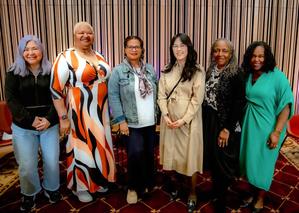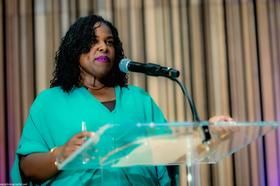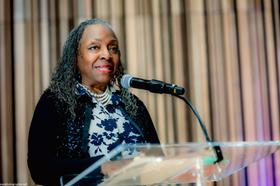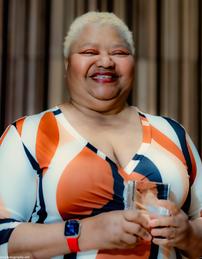
|
|
| WNDB chair Ellen Oh, with Sherri Winston, Eden Royce, June Hur, Ekua Holmes, Renée Watson (photo: Nancy Anderson Cordell) |
|
We Need Diverse Books hosted the 2025 Walter Dean Myers Awards and the "Many Voices, One World" symposium at the Martin Luther King Jr. Memorial Library in Washington, D.C., this past Friday. Kathie Weinberg, co-director of the Walter Dean Myers Awards, welcomed the audience, which included, along with the winners, honorees, committee, and interested adults, students from eight middle and high schools. Ellen Oh, a founding member and 10-year chair of WNDB, introduced the event by admitting that she comes "because of the students. You all coming here is what makes this event great--you're my favorite part of this ceremony." Christopher Myers spoke briefly, saying that "even as [his father] was shuffling off this mortal coil, he was writing me notes about one more story, one more thing. He understood it's important that we support each other in getting out the stories that are inside of us." And to the students he directed his last comments: "We here are all a collection of stories. You are an anthology. You are a diversity of stories and histories and cultures all within yourself. The opportunity to share that with each other is a gift."
Before the three winners of the 2025 Walter Dean Myers Awards--Renée Watson, Ekua Holmes, and Sherri Winston--spoke, Oh invited students from Eliot-Hine Middle School, Columbia Heights Education Campus/Bell High School, and Montgomery Blair High School to come up front and perform sections of dialogue from three of Myers's recently reissued titles. (Editorial note: the kids killed it.)

|
|
| Renée Watson (photo: Nancy Anderson Cordell) |
|
Renée Watson opened her acceptance speech for her teen category winner, Black Girl You Are Atlas (Kokila/PRH), with a quote from Myers's novel Scorpions: "It's a hard life sometimes and the biggest temptation is to let how hard it is be an excuse to weaken." "Hold onto hope," Watson told the audience, "Hold onto the people who love you, who hold you down. Hold on and be intentional about having joy in life. That is what Black Girl You Are Atlas is all about... I do not mean 'do not cry.' I do not mean do not be angry. I mean feel the pain and fight anyway." Watson spoke directly to the young people: "Your story can never be erased because you carry your story inside of you. Stories remind us that as a people, we have survived, and we will survive. It reminds us that we are not alone."

|
|
| Ekua Holmes (photo: Nancy Anderson Cordell) |
|
Ekua Holmes, the other teen category winner, for her illustrations in Black Girl You Are Atlas, spoke about how, after meeting Watson "in 2016 when we both won Coretta Scott King awards," she hoped to one day do a book project together. "Dreams do come true." There is a throughline that connects our experiences as Black girls and Black women, Holmes said--"Black Girl You Are Atlas is the kind of book you carry in your bag, just because. It's the kind of book you give your granddaughter when she turns 16. These are poems that bring the sun on gray days." To the adults in the auditorium, she said "we must write and illustrate more books. Buy more books. Gift more books. Donate more books." To the students: "You are your ancestors' wildest dream."
 |
|
| Sherry Winston (photo: Nancy Anderson Cordell) |
|
Sherri Winston, the younger readers category winner for Shark Teeth (Bloomsbury) began her speech with, "As usual, I'm the one who didn't prepare anything. I never do." Shark Teeth started as a poem, she said. "My children dragged me to some event, and I got there and there weren't any other moms. I was there to hold coats. I got bored and this poem came into my ear. I wrote the poem, and I basically built this book around it--I wanted the whole book to feel like a poem."
Oh moderated the panel featuring Winston, Watson, Holmes, young readers category honoree Eden Royce (The Creepening of Dogwood House, Walden Pond Press/Harper), and teen readers category honoree June Hur (A Crane Among Wolves, Feiwel & Friends). "Our theme this year is 'Many Voices, One World,' " Oh said, "Where do you see your voice fitting into the publishing landscape?" Watson said she felt her place was to "keep writing. I'm going to keep writing about Black girls, I'm going to keep writing about big-bodied Black girls; I'm going to keep telling the truth through my writing." She continued: "I'm grateful that I have a past to look back to. There were a people who were enslaved in this country and when they were fighting, they didn't have anything to look back to--there was no proof that fighting for equal rights would make change. But I have a past I can look back to and see my place in it."
Holmes answered the question: "As an artist. I feel like I have an opportunity to address history through my artwork and share stories through my canvases." Hur recalled that, when writing her first book, she was writing "as a girl who grew up being ashamed of being Korean." But when she finally discovered Korean history, she "fell madly in love with it. Studying Korean history was like looking in a mirror--so much of who I am takes root in Korea's past." Royce noted that "as a Gullah Geechee person, it's extremely important to write about my culture because, even within the United States, there isn't a lot of knowledge about my people. As I got older, I started to embrace the way we spoke, and I wanted to be able to write that language, that sound, that dialect into a work." Winston said she saw her place "in this shifting landscape of children's literature" as "being responsible for continuing to promote hope and joy and knowledge in this younger generation." I write, she said, "to encourage people to be loud, to be too much, to fuse who you are in your heart and in your home with who you show to the world."
Excellent student questions followed--"How do you include diversity in literature without taking on the weight of the world?"; "What would you tell your younger self?"--which led to an especially candid and touching discussion of writing from Watson. When asked what inspired her to write her story, Watson admitted that she rarely writes herself into the work--while she may pull from personal experience, she keeps a distance between herself and her writing. But "when I was writing this book, I wanted to talk directly to you," she said. "I wanted you to know that you're worthy and your story matters." For me to say that to you, Watson emphasized, "I had to live that. Which means I had to do the brave thing and share my own story--the truth of me and not the fiction."
The panel was followed by a book fair and signing line--every student received the three reissued Walter Dean Myers books and could purchase any of the Walter Award-winning books from a Politics and Prose pop-up. More information about WNDB and the award can be found here. --Siân Gaetano, children's and YA editor, Shelf Awareness

